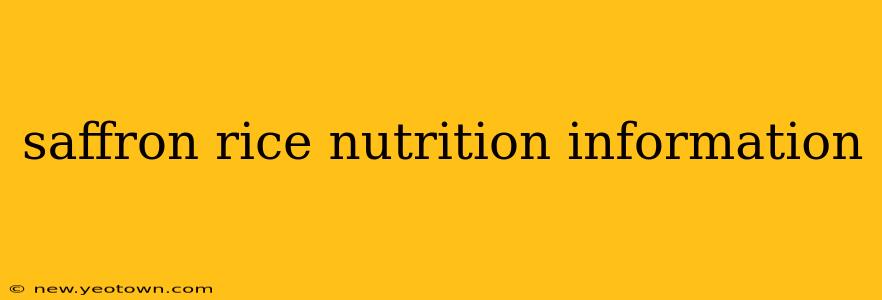Saffron rice, with its vibrant golden hue and delicate aroma, is a culinary gem enjoyed across the globe. But beyond its captivating beauty lies a nutritional profile worth exploring. This isn't just a side dish; it's a flavorful contribution to a balanced diet, especially when prepared thoughtfully. Let's embark on a journey to uncover the nutritional secrets within this beloved dish.
Our story begins not in a bustling kitchen, but in the fields where saffron, the world's most expensive spice, is painstakingly harvested. The crimson threads, each a tiny treasure, imbue the rice with their unique character—a subtle sweetness, a captivating fragrance, and, as we'll discover, a surprising array of health benefits.
What are the Nutritional Benefits of Saffron Rice?
Saffron itself contributes a modest amount of nutrients, but it’s the combination with rice that creates a well-rounded nutritional profile. The nutritional content will vary depending on the type of rice used (brown rice offers more fiber than white) and the amount of saffron added. However, generally speaking, saffron rice provides:
- Carbohydrates: The primary source of energy in saffron rice comes from carbohydrates, largely derived from the rice itself. This makes it a good source of fuel for physical activity.
- Fiber (depending on rice type): Brown rice, a popular choice for saffron rice, is richer in fiber than white rice, promoting healthy digestion and contributing to feelings of fullness.
- Protein: While not a primary protein source, saffron rice offers a modest amount of protein, particularly if you use a rice variety higher in protein content.
- Antioxidants: Saffron is a powerhouse of antioxidants, compounds that combat cell damage caused by free radicals. These antioxidants may contribute to improved overall health and reduced risk of chronic diseases. Note that the amount of antioxidants you get depends on the quantity of saffron used.
- Vitamins and Minerals: The nutritional content varies depending on the type of rice used, but rice generally offers small amounts of various vitamins and minerals, including thiamin, niacin, and iron (particularly in brown rice).
How Many Calories are in Saffron Rice?
The caloric content of saffron rice depends on several factors:
- Type of Rice: Brown rice generally has more calories than white rice due to its higher fiber content.
- Serving Size: A larger serving will naturally contain more calories.
- Added Ingredients: The inclusion of butter, oil, or other ingredients during cooking will significantly increase the calorie count.
A typical serving of saffron rice (using white rice) might contain around 200-250 calories, while a serving of brown saffron rice could be slightly higher. Always check nutrition labels on pre-packaged saffron rice mixes for accurate information.
Is Saffron Rice Good for Weight Loss?
While saffron rice isn't a magic weight-loss food, it can be part of a healthy weight-management strategy. Opting for brown rice over white rice increases fiber intake, promoting satiety and potentially reducing overall calorie consumption. However, portion control remains crucial for effective weight management.
Is Saffron Rice Good for Diabetics?
Saffron rice's suitability for diabetics depends largely on the type of rice used and portion control. Brown rice, with its higher fiber content, can help regulate blood sugar levels more effectively than white rice. However, individuals with diabetes should consult their doctor or a registered dietitian to determine appropriate serving sizes and dietary adjustments.
What are the Potential Side Effects of Eating Saffron Rice?
Saffron, while generally safe, can cause side effects in large quantities. These can include nausea, vomiting, and allergic reactions in susceptible individuals. However, the amount of saffron typically used in cooking is unlikely to cause these problems.
Saffron Rice: A Culinary and Nutritional Journey
In conclusion, saffron rice is more than just a visually appealing dish; it offers a blend of carbohydrates, fiber (depending on the rice), and antioxidants, making it a valuable addition to a balanced diet. While mindful of portion control and the type of rice used, you can enjoy this flavorful culinary experience without compromising your health goals. Remember, moderation and a varied diet are key to reaping the benefits of any food, including the enchanting saffron rice.

